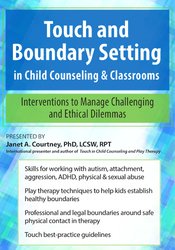

Touch in therapy with children has long been a taboo topic and a hotbed of controversy!
We, as practitioners and educators, are challenged daily with ethical and clinical/ educational dilemmas related to touch from a child’s request for a hug, to a child inappropriately touching, to physical acts of aggression.
Join Janet Courtney, PhD, LCSW, RPT and leading expert in the field of touch, in this ground-breaking workshop. You will learn the current research related to the neurobiology of touch and attachment, plus the varied mediating factors that impact child initiated verses practitioner/educator initiated touch.
Discover varied touch-informed play therapy approaches that ethically intervene with child problems and diagnoses related to trauma, sexual and physical abuse, domestic violence, ADHD, anxiety, and attachment.
You’ll walk away with new interventions to successfully manage in-the-moment challenging touch behaviors, as well as play therapy-based techniques to help kids and teens establish healthy touch boundaries. Increase your professional awareness and competency through lab activities, and clinical and ethical touch guidelines to immediately lower concerns of liability.
| File type | File name | Number of pages | |
|---|---|---|---|
| Manual 053095 (6.29 MB) | 69 Pages | Available after Purchase |

Janet A Courtney, PhD, LCSW, RPT-S™, is founder of FirstPlay Therapy®. She is a Registered Play Therapy-Supervisor, TEDx Speaker and past Chair of the Association for Play Therapy Ethics and Practice Committee and past President of the Florida Association for Play Therapy, FirstPlay Therapy was awarded third place overall in the Best Practices Showcase for FirstPlay Therapy at the First 1000 Days Infant Mental Health Summit (2018) along with the Children’s Healing Institute. She is author and editor of the following books: Infant Play Therapy: Foundations, Programs, Models and Practice, and Healing Child and Family Trauma through Expressive and Play Therapies: Art, Nature, Storytelling, Body & Mindfulness and Nature-based Play & Expressive Therapies: Interventions for Children, Teens and Families, and Touch in Child Counseling and Play Therapy: An Ethical and Clinical Guide. Her research in practitioner experiences of training in touch and Developmental Play Therapy is published in the American Journal of Art Therapy and the International Journal of Play Therapy. She is a contributing author in several books including Play-based Interventions for Children and Adolescents with Autism Spectrum Disorders and the book Environmental Expressive Therapies (2017), and Play Therapy Supervision (2023). She is also published in the Journal of Therapeutic Horticulture. She offers a certification in FirstPlay Therapy® and provides training to professionals in the Ethical and Clinical Competencies of Touch, FirstPlay® Therapy, Ericksonian-based StoryPlay®, Expressive Therapies, and Nature-based Play Therapy. She has been invited to speak nationally and internationally including Bali, Indonesia, the Cayman Islands, England, Ireland, Morocco, Russia and the Ukraine. She is a provider through the Florida state boards of Mental Health and Massage Therapy, and an approved provider through the Association for Play Therapy. She specializes in infant mental health and infant play therapy, attachment, and Trauma related issues. Dr. Courtney’s new form of Kinesthetic Storytelling® can be found in her children’s book, The Magic Rainbow. Website: www.firstplaytherapy.com
Speaker Disclosures:
Financial: Janet Courtney is founder of FirstPlay™ Therapy. She is in private practice and an adjunct professor at Barry University. Dr. Courtney receives a speaking honorarium and recording royalties from PESI, Inc. She has no relevant financial relationships with ineligible organizations.
Non-financial: Janet Courtney is a member of the National Association of Social Workers, World Association for Infant Mental Health, and the International Association for the Study of Affective Touch.
Breaking down the Touch Controversy
Neurobiology of Touch
Assessing Mediating Factors of Touch
Case Examples/Ethical Dilemmas - Respond, Intervene & Set Safe Boundaries in Clinics/Classrooms
Play Therapy & Assessments - Touch as an Intervention
Lab Experiential—Growing Professional Self-Awareness
Become a “Touch Educator” with Creative Play-Based Interventions
Growing Ethical Competency in Touch
Please wait ...